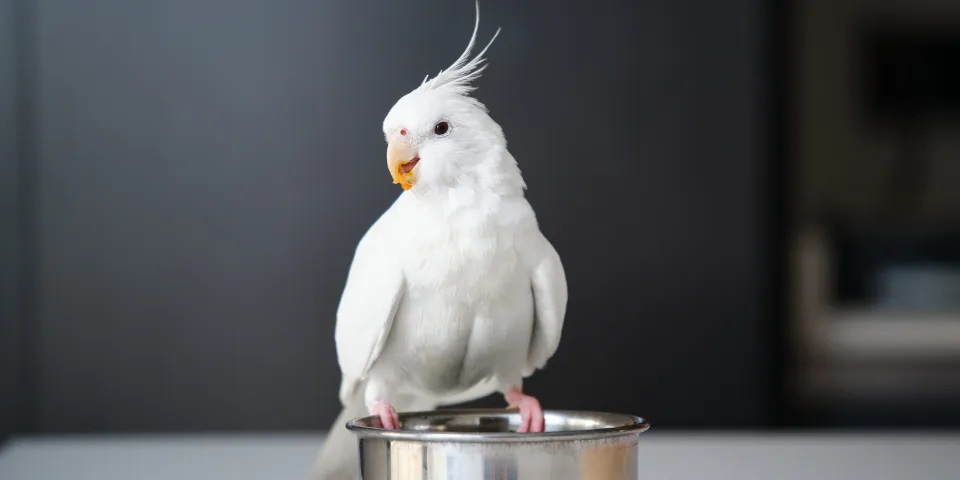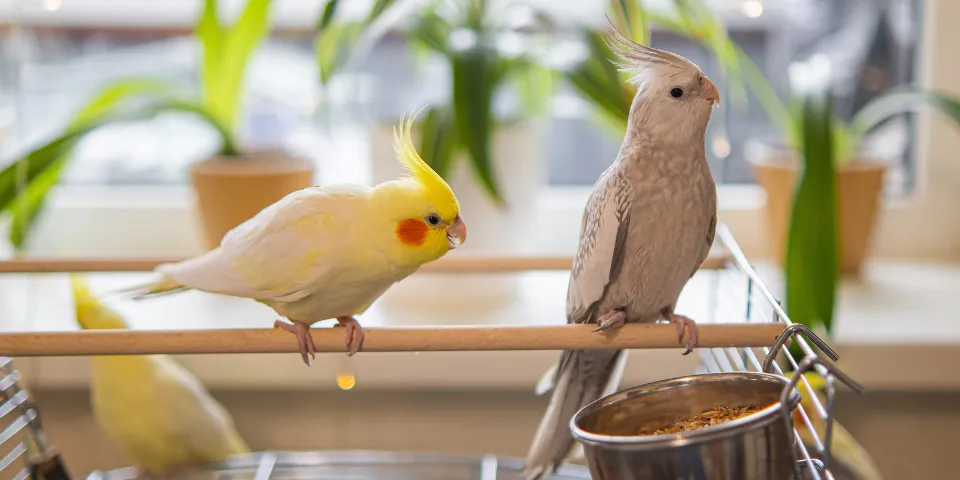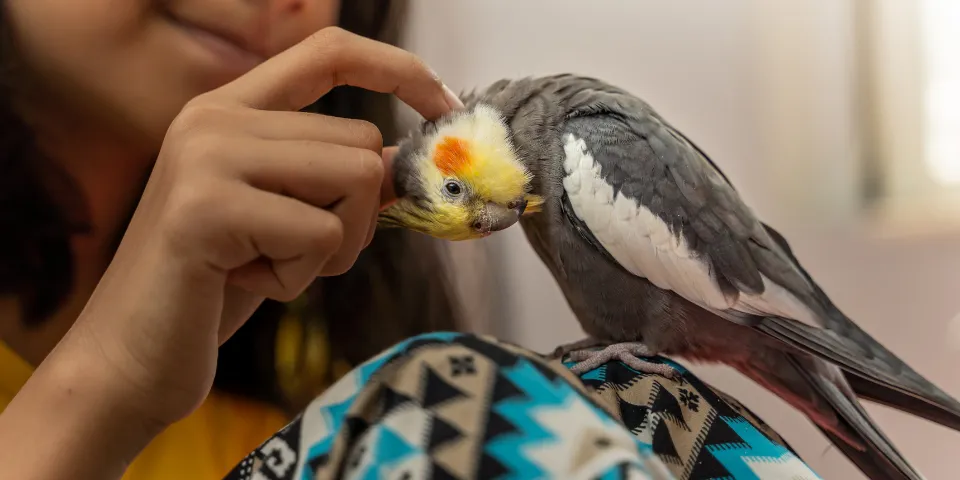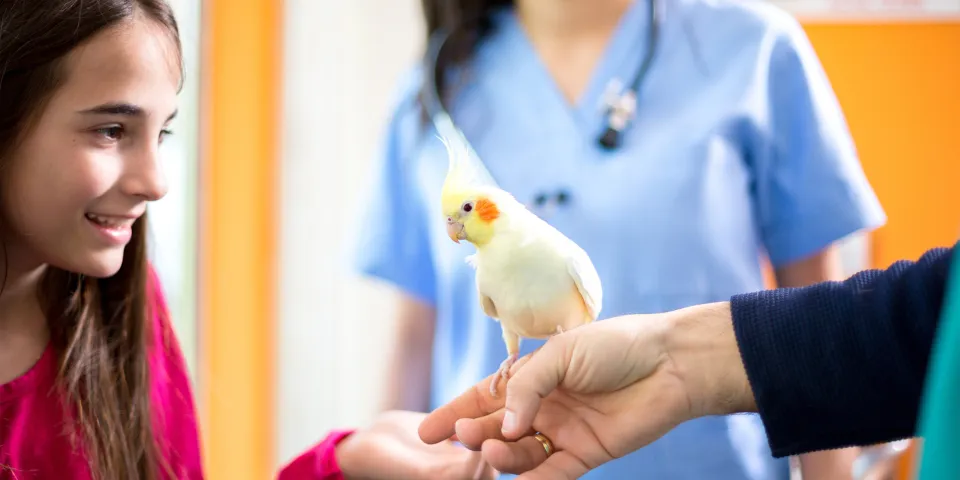Cockatiels are captivating birds, known for their vibrant personalities and affectionate nature. These intelligent companions bring immense joy to any household, and ensuring their well-being is a paramount responsibility for every owner. A truly happy and healthy cockatiel thrives on a balanced combination of proper Cockatiel Diet And Nutrition, a stimulating living environment, and consistent, engaging interaction. This comprehensive guide, informed by expert insights from Dr. Veronica Pardini, DVM, CertAqVET, delves into the essential aspects of caring for your feathered friend, with a particular focus on their dietary needs, to help them lead a long, happy, and healthy life.
The Foundation of Health: Cockatiel Diet and Nutrition Essentials
The cornerstone of a healthy cockatiel is a meticulously planned cockatiel diet and nutrition regimen. While these charming birds are often perceived as simple eaters, their dietary requirements are complex and crucial for preventing various health issues. Understanding the right balance of various food types is key to providing optimal care.
Seed Mixes vs. Pellets: Making the Right Choice
Historically, many parrot species, including cockatiels, have been fed primarily on seed mixes. While seeds are certainly palatable and enjoyed by cockatiels, they often lack the complete nutritional profile necessary for sustained health. A diet exclusively based on seeds can lead to deficiencies, obesity, and other health problems over time. Therefore, modern veterinary recommendations strongly lean towards a well-balanced pellet diet as the primary nutritional source.
Pellets are formulated to provide a comprehensive array of vitamins, minerals, and nutrients that seeds often miss. Ongoing research continues to refine our understanding of optimal avian diets, but current consensus suggests offering high-quality pellets daily. This should be supplemented with a measured portion of approximately two teaspoons of a high-quality seed mix. When selecting a seed mix, it’s advisable to choose one that does not contain sunflower seeds, which are high in fat and can contribute to an unbalanced diet. ZuPreem’s Sensible Seed is often highlighted as an excellent option for its thoughtful formulation.
 Albino cockatiel eating from metal dish
Albino cockatiel eating from metal dish
The Goodness of Fresh Fruits and Vegetables
Beyond the core of pellets and a limited seed mix, incorporating a variety of fresh fruits and vegetables is vital for enhancing your cockatiel’s diet and nutrition. These fresh additions not only make their meals more enjoyable but also provide essential vitamins, antioxidants, and fiber. Many cockatiels show a preference for smaller leaf varieties like parsley, dill, and cilantro, making these excellent starting points.
Expand their palate and nutrient intake with nutrient-rich vegetables such as sprouts, broccoli, a medley of squashes, green beans, and bell peppers. For a sweet treat packed with additional vitamins, consider offering blackberries, blueberries, raspberries, strawberries, figs, kiwi, persimmons, mango, and lychee. Always ensure fruits and vegetables are thoroughly washed and cut into appropriate, bite-sized pieces to prevent choking. Introduce new items gradually to gauge your bird’s preferences and ensure they tolerate them well.
Understanding Supplements for Cockatiels
For cockatiels receiving a proper, balanced diet primarily composed of high-quality pellets supplemented with fresh produce, additional supplements are generally not required. The comprehensive nature of quality pellets typically covers their vitamin and mineral needs. However, for owners who prefer an extra measure of caution, or specifically for egg-laying females who have increased calcium requirements, a cuttlebone can be a beneficial addition to their cage. Cuttlebones provide a natural source of calcium and also offer an opportunity for beak conditioning. Always consult with an avian veterinarian before introducing any new supplements to your bird’s diet to ensure it’s truly necessary and appropriate.
Hydration: A Constant Need
Equally as important as their food is ensuring your cockatiel has constant access to fresh, clean water. Hydration is fundamental for all bodily functions, including digestion and temperature regulation. While water bowls are often considered the optimal method for providing water for most birds, alternative options such as water bottles and dispensers are also available. Regardless of the chosen method, the absolute priority is to maintain a consistent and clean supply of water. Water dishes should be cleaned daily to prevent bacterial growth, and water bottles should be checked regularly to ensure they are functioning correctly and not clogged.
Creating a Haven: Ideal Cockatiel Housing
While cockatiel diet and nutrition are foundational, a comfortable and stimulating living environment is equally crucial for your bird’s overall health and happiness. Their cage is their sanctuary and playground, and it should be designed to meet their physical and psychological needs.
Optimal Cage Size for Active Birds
Despite their relatively small stature, cockatiels are remarkably active birds that require ample space to thrive. It is crucial to provide them with a large enclosure that allows them to move freely, stretch their wings, and engage in natural behaviors. The minimum recommended cage size is 20-24 inches square, but if space permits, opting for an even larger cage is highly recommended. A spacious cage should include at least two perches, positioned far enough apart to encourage jumping or short flights between them, promoting physical exercise.
The Importance of Varied Perches
Cockatiels, much like other avian species, greatly benefit from a diverse range of perch sizes and textures within their environment. Providing varied perch diameters is essential for promoting optimal foot health and preventing conditions like pododermatitis (bumblefoot). Different perch sizes mimic the varying surfaces birds would encounter in their natural habitats, keeping their feet active and strong. When selecting perches, consider incorporating natural branches of varying thicknesses, rope perches, and flat platforms made from bird-safe materials. Avoid using dowel perches as the sole option, as these can lead to foot problems over time.
 Two cockatiels on perch in cage
Two cockatiels on perch in cage
Engaging Toys for Physical and Mental Well-being
Toys are not just for fun; they are vital tools for supporting both the physical and mental health of your cockatiel. When choosing toys, prioritize safe, non-toxic, and stimulating options to keep your bird healthy, engaged, and prevent boredom-induced behavioral issues. Offering a variety of toys daily encourages exploration and activity.
Foraging Toys
Concealing treats within toys that require effort to access is an excellent way to encourage problem-solving, stimulate their minds, and mimic their natural foraging instincts. This provides mental enrichment and prevents boredom.
Chew Toys
Birds have a strong instinct to chew, which is essential for beak health and maintenance. Offer safe, bird-friendly materials such as untreated wooden blocks, natural fiber toys, or shreddable paper toys to satisfy this natural urge.
Interactive Toys
Toys that produce sounds, like small bells (ensuring the clapper is too large to swallow), or toys with reflective surfaces like mirrors, can captivate a cockatiel’s attention and provide entertainment. However, monitor how your bird interacts with mirrors, as some can become overly territorial or obsessed.
Swinging Perches
Swings offer more than just a place to rest; they provide physical exercise, improve balance, and offer a change in scenery, enriching their environment and breaking monotony.
The Power of Toy Rotation
To maintain your cockatiel’s interest and engagement, it’s highly recommended to rotate their toys regularly, ideally every 2 weeks. This keeps their environment dynamic and exciting, preventing them from becoming bored with the same old toys and encouraging continued interaction and exploration.
Building Bonds: Fun and Interaction with Your Cockatiel
Beyond optimal cockatiel diet and nutrition and a proper cage, spending quality time with your bird is paramount for forging a strong, trusting bond. These intelligent creatures thrive on social interaction, and consistent, positive moments together will make them feel secure and loved.
Nurturing Trust Through Consistent Interaction
Allow your feathered friend to gradually become familiar with your presence and touch by spending regular, gentle moments together. This could involve simply being near their cage, talking softly to them, or offering treats by hand. Patience is key; never force interaction, and always respect your bird’s pace and comfort level. Over time, consistent positive interactions build trust, making your cockatiel more receptive to handling and play.
 Woman petting cockatiel perched on her shoulder
Woman petting cockatiel perched on her shoulder
The Benefits of Clicker Training
Clicker training is an incredibly effective and rewarding method to enhance communication and reinforce desirable behaviors in your cockatiel. By associating the distinct sound of a clicker with a treat and praise, you establish a clear language your bird can understand. This form of positive reinforcement not only strengthens your bond by creating positive shared experiences but also provides valuable cognitive stimulation, teaching your bird to learn and respond to cues. Start with simple commands like stepping up onto your finger and gradually progress to more complex tricks.
Remember, every bird possesses a unique personality, and respecting their individual preferences and pace during interactions is crucial. A patient, gentle, and consistent approach will significantly contribute to developing a deep and trusting connection with your cherished pet.
Enriching Lives: Playtime and Mental Stimulation
Playtime is an essential component of a cockatiel’s well-being, complementing their diet and nutrition by ensuring physical activity and mental sharpness. Engaging your cockatiel in various play activities helps prevent boredom, reduces stress, and strengthens your bond.
Creative Interactive Play Ideas
Actively engage in interactive play using toys that you can manipulate. This could involve dangling a favorite toy for them to grab, gently rolling a small bird-safe ball for them to chase, or playing peek-a-boo. Interactive games mimic natural social behaviors and keep your bird physically and mentally active.
Obstacle Courses and Exploration
For the more adventurous cockatiel, consider creating simple obstacle courses using perches, various toys, and other bird-safe items. This adds an element of physical activity, encourages exploration, and provides significant mental stimulation as they navigate their environment. You can change the layout periodically to keep it fresh and engaging.
Foraging for Fun
Beyond using foraging toys in their cage, you can create foraging opportunities during playtime. Hide small, healthy treats in different locations around a bird-safe play area, encouraging your cockatiel to search and discover. This mimics their natural instinct to forage for food in the wild and provides valuable mental enrichment.
Musical Enrichment
Cockatiels often exhibit a keen enjoyment of musical sounds. You can offer small, bird-safe musical instruments for them to interact with, or simply play gentle music during playtime. Many cockatiels enjoy singing along, chirping, or dancing to the rhythm, which can be a delightful form of expression and entertainment for them.
Quality Time and Observation
The most important aspect of playtime is simply spending quality time interacting with your cockatiel. Gently talk to them, sing, or mimic their sounds. This direct interaction reinforces your bond and allows you to observe their behavior. Always be mindful of your cockatiel’s body language and preferences during playtime. If they show signs of fatigue, disinterest, or stress, allow them to rest and retreat to their safe space.
Proactive Health: Essential Veterinary Care for Cockatiels
Even with an optimal cockatiel diet and nutrition plan and a stimulating environment, proactive veterinary care is indispensable. Regular check-ups and prompt attention to any health concerns are crucial for maintaining your bird’s long-term health, as birds are masters at hiding signs of illness.
Finding Your Avian Veterinarian
Before you even welcome a new feathered companion into your home, it’s critically important to locate a qualified avian veterinarian in your area. Establishing a relationship with a trusted, experienced vet specializing in birds is a vital, proactive step that ensures your cockatiel receives proper care, both preventatively and during potential emergencies. Not all veterinarians are trained in avian medicine, so a specialist is essential.
The Value of Annual Wellness Exams
Annual wellness exams are imperative for the ongoing well-being of cockatiels. These comprehensive check-ups typically encompass a thorough physical examination, which may include palpation, auscultation, and visual inspection. Depending on the bird’s age, history, and the vet’s recommendations, radiographs (X-rays) and blood work may also be performed to assess internal organ health and detect any underlying issues before they become serious. Early detection is key to successful treatment in birds.
Recognizing Signs of Illness: When to Seek Emergency Care
Are you familiar with the subtle signs that can indicate your cockatiel is unwell? Birds often mask symptoms of illness as a survival instinct, making it crucial for owners to be vigilant. There are a number of symptoms that can indicate a serious health issue with your cockatiel, requiring immediate veterinary evaluation. Always remember that timely intervention is paramount to maintaining your bird’s health and improving prognosis.
Signs your cockatiel may be sick include:
- Excessive sleeping or lethargy
- Changes in your bird’s droppings (color, consistency, volume)
- Decreased appetite or changes in drinking habits
- Abnormal breathing (tail bobbing, open-mouthed breathing, sneezing, wheezing)
- Regurgitation (distinct from normal crop emptying for feeding young)
- Fluffed feathers, hunched posture, or reluctance to move
- Discharge from eyes or nares
- Weight loss
- Any noticeable change in behavior or appearance
 Young girl with pet cockatiel at veterinarian
Young girl with pet cockatiel at veterinarian
Caring for a cockatiel is a profoundly rewarding journey that demands dedication, knowledge, and close attention to detail. By truly understanding their nuanced cockatiel diet and nutrition requirements, providing a comfortable and enriching living environment, engaging in regular stimulating playtime activities, and ensuring consistent expert veterinary care, you will undoubtedly create a happy, healthy, and thriving home for your beloved feathered companion. A holistic approach, with nutrition as its cornerstone, will empower your cockatiel to enjoy a vibrant life filled with joy and companionship.
